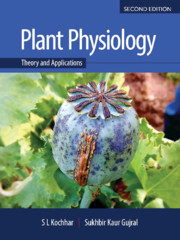Book contents
- Frontmatter
- Contents
- Foreword
- Preface to the Second Edition
- Preface to the First Edition
- Acknowledgements
- Some Common Abbreviations used in the Text
- Abbreviations for Units
- Unit I Water and Mineral Translocation in Plants
- Unit II Metabolism and Bioenergetics
- Unit III Growth and Development
- Unit IV Physiological Stress and Secondary Metabolites – Their Role in Metabolism
- Unit V Crop Physiology – An Innovative Approach
- Unit VI Breakthroughs in Plant Physiology
- Unit VII Some Experimental Exercises
- Glossary
- References
- Index
- Colour Plates
Chapter 20 - Agricultural Implications of Plant Physiology
Published online by Cambridge University Press: 12 May 2020
- Frontmatter
- Contents
- Foreword
- Preface to the Second Edition
- Preface to the First Edition
- Acknowledgements
- Some Common Abbreviations used in the Text
- Abbreviations for Units
- Unit I Water and Mineral Translocation in Plants
- Unit II Metabolism and Bioenergetics
- Unit III Growth and Development
- Unit IV Physiological Stress and Secondary Metabolites – Their Role in Metabolism
- Unit V Crop Physiology – An Innovative Approach
- Unit VI Breakthroughs in Plant Physiology
- Unit VII Some Experimental Exercises
- Glossary
- References
- Index
- Colour Plates
Summary
The science of Plant Physiology deals with various life processes occurring both within cells, and between cells and the environment. The former includes metabolic pathways like photosynthesis, respiration, nitrogen and fat metabolism, translocation of food materials and growth regulators and similar processes; while the latter encompasses diffusion of gases, absorption of water and minerals, ascent of sap and transpiration and such. Understanding the physiological requirements of different crops is the key to successful agriculture. A deep understanding of water, nutritional and other edaphic and climatic parameters controlling the crop physiological functions is essential for optimizing productivity for the sustainable development of our exploding population. To emphasise this, we will examine the pre-green revolution era when we had tall varieties of wheat and rice with a tendency towards lodging when heavily fertilised. Using the Norin 10 dwarfing genes in wheat, and the Dee-geo-woo-gen genes in rice, agricultural scientists were able to change the morphological architecture (the Ideotype concept) by developing high-yielding dwarf and semi-dwarf varieties. But their success depended upon the crop's water, nitrogenous fertilizer and other edapho-climatic requirements which were optimised through the concerted efforts of plant physiologists, agronomists and others. This is the success story of the Green Revolution in the early 1960s.
Plant Physiology is a rapidly advancing field of botany and serves as the foundation for the numerous advances in agriculture (including horticulture), environmental sciences, floriculture, agronomy, plant pathology, forestry, and pharmacology. Adequate knowledge and understanding of crop physiology is the key to success in optimizing farm productivity in terms of yield and quality. In the case of crops, their genetic make-up and environmental factors play a crucial role in manipulating their growth. Once the breeders understand the physiology of crops they are trying to handle, it becomes easy for them to deal with the problems for selecting varieties for higher yield and to cope up with environmental stresses as well as insect invasions, etc.
- Type
- Chapter
- Information
- Plant PhysiologyTheory and Applications, pp. 613 - 624Publisher: Cambridge University PressPrint publication year: 2020

